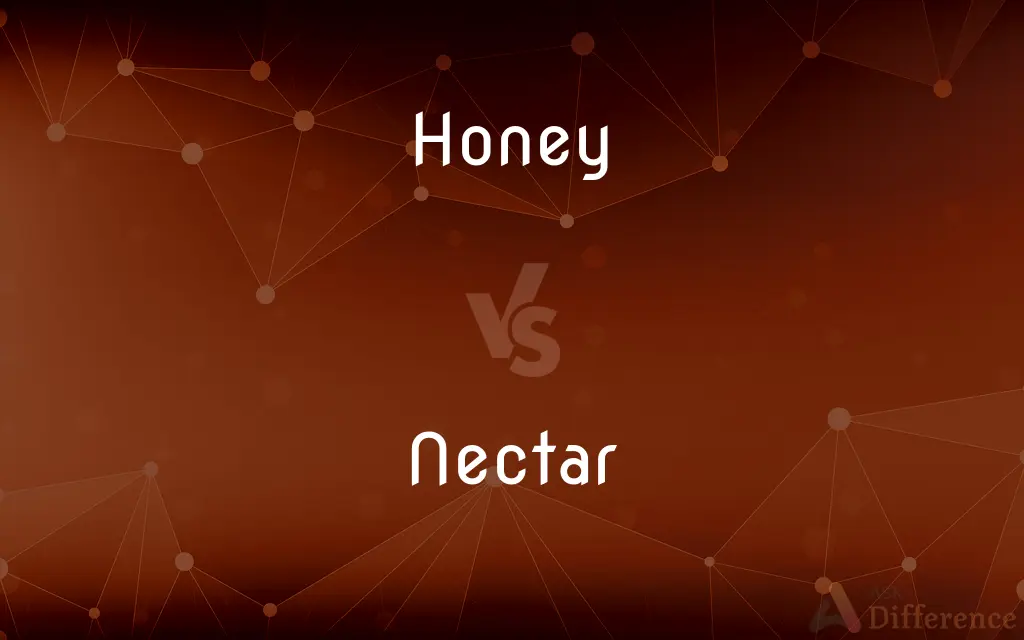Honey vs. Nectar — What's the Difference?
Edited by Tayyaba Rehman — By Urooj Arif — Updated on April 15, 2024
Honey is a thick, sweet substance made by bees from nectar, which is a sugary liquid produced by plants to attract pollinators.

Difference Between Honey and Nectar
Table of Contents
ADVERTISEMENT
Key Differences
Honey is produced by bees through the enzymatic digestion of nectar, which they collect from various flowers. Whereas nectar is directly secreted by the nectaries of plants and is not processed by any other organism.
Honey undergoes a transformation inside a bee’s honey stomach where enzymes break down complex sugars into simpler ones, making it more digestible and less susceptible to spoilage. On the other hand, nectar is a raw, watery solution predominantly composed of sucrose, glucose, and fructose in varying proportions.
Honey is stored and used by bees as a food source, particularly during colder months. Whereas nectar serves primarily as a lure to attract pollinators like bees, butterflies, and hummingbirds, aiding in plant reproduction.
Honey has antibacterial properties and a longer shelf life due to its low water content and high acidity. In contrast, nectar is much more perishable and lacks the antibacterial benefits found in honey.
Honey varies widely in color and flavor, influenced by the types of flowers visited by bees. Meanwhile, nectar generally has a lighter flavor and color, which varies less dramatically between different plants.
ADVERTISEMENT
Comparison Chart
Source
Processed by bees from nectar
Secreted by plant nectaries
Composition
Sugars, water, enzymes, minerals, vitamins
Mainly sucrose, glucose, and fructose
Function
Food source for bees, human food, medicinal uses
Attracts pollinators to plants
Physical Properties
Thick, sticky, and varies in color
Thin, watery, generally clear
Biological Role
Stored and consumed by bees
Facilitates pollination
Compare with Definitions
Honey
A sweet, viscous food substance made by bees primarily from floral nectar.
She drizzled honey over her pancakes.
Nectar
In mythology, the drink of the gods.
He referred to the rare wine as nectar.
Honey
A term of endearment.
Honey, could you help me with this?
Nectar
Figuratively, something very pleasing to taste or smell.
The aroma of the stew was pure nectar.
Honey
As an adjective to describe something favorable or pleasing.
They enjoyed a honey vacation.
Nectar
A sugary fluid secreted by plants to attract pollinating insects and birds.
Bees busily gathered nectar from the blossoms.
Honey
Colloquially, a sweet or cherished item or person.
That car is his honey.
Nectar
As an adjective, describing something sweet or delightful.
Their nectar moments together were cherished.
Honey
Used metaphorically to denote something of excellent quality.
He has a voice that is smooth like honey.
Nectar
Used to describe any delicious drink.
She savored the nectar of freshly squeezed orange juice.
Honey
Honey is a sweet, viscous food substance made by honey bees and some related insects, such as stingless bees. Bees produce honey from the sugary secretions of plants (floral nectar) or from secretions of other insects (such as honeydew), by regurgitation, enzymatic activity, and water evaporation.
Nectar
Nectar is a sugar-rich liquid produced by plants in glands called nectaries or nectarines, either within the flowers with which it attracts pollinating animals, or by extrafloral nectaries, which provide a nutrient source to animal mutualists, which in turn provide herbivore protection. Common nectar-consuming pollinators include mosquitoes, hoverflies, wasps, bees, butterflies and moths, hummingbirds, honeyeaters and bats.
Honey
A sweet, sticky yellowish-brown fluid made by bees and other insects from nectar collected from flowers.
Nectar
A sweet liquid that many plants secrete from specialized structures, often inside flowers, where it serves to attract pollinators such as certain insects and birds. Bees use nectar to make honey.
Honey
An excellent example of something
It's one honey of an adaptation
Nectar
Greek & Roman Mythology The drink of the gods.
Honey
A sweet yellowish or brownish viscid fluid produced by various bees from the nectar of flowers and used as food.
Nectar
A beverage containing fruit juice or purée.
Honey
A similar substance made by certain other insects.
Nectar
A delicious or invigorating drink.
Honey
A sweet substance, such as nectar or syrup.
Nectar
The drink of the gods.
Honey
Sweetness; pleasantness
"The first few years could not have been all honey" (Nadine Gordimer).
Nectar
(by extension) Any delicious drink, now especially a type of sweetened fruit juice.
Honey
(Informal) Sweetheart; dear. Used as a term of endearment.
Nectar
(botany) The sweet liquid secreted by flowers to attract pollinating insects and birds.
Honey
(Informal) Something remarkably fine
A honey of a car.
Nectar
(intransitive) To feed on nectar.
Honey
To sweeten with honey; add honey to.
Nectar
The drink of the gods (as ambrosia was their food); hence, any delicious or inspiring beverage.
Honey
To make pleasant or appealing
His words were honeyed as he spoke.
Nectar
A sweetish secretion of blossoms from which bees make honey.
Honey
To give a yellow or golden color to.
Nectar
A sweet liquid secretion that is attractive to pollinators
Honey
(uncountable) A viscous, sweet fluid produced from plant nectar by bees. Often used to sweeten tea or to spread on baked goods.
The honey in the pot should last for years.
Nectar
Fruit juice especially when undiluted
Honey
(countable) A variety of this substance.
Nectar
(classical mythology) the food and drink of the gods; mortals who ate it became immortal
Honey
(rare) Nectar.
Honey
(figuratively) Something sweet or desirable.
Honey
A term of affection.
Honey, would you take out the trash?
Honey, I'm home.
Honey
A woman, especially an attractive one.
Man, there are some fine honeys here tonight!
Honey
A spectrum of pale yellow to brownish-yellow colour, like that of most types of (the sweet substance) honey.
Honey
Involving or resembling honey.
Honey
Of a pale yellow to brownish-yellow colour, like most types of honey.
Honey
(transitive) To sweeten; to make agreeable.
Honey
(transitive) To add honey to.
Honey
(intransitive) To be gentle, agreeable, or coaxing; to talk fondly; to use endearments.
Honey
(intransitive) To be or become obsequiously courteous or complimentary; to fawn.
Honey
A sweet viscid fluid, esp. that collected by bees from flowers of plants, and deposited in the cells of the honeycomb.
Honey
That which is sweet or pleasant, like honey.
The honey of his language.
Honey
Sweet one; - a term of endearment.
Honey, you shall be well desired in Cyprus.
Honey
To be gentle, agreeable, or coaxing; to talk fondly; to use endearments; also, to be or become obsequiously courteous or complimentary; to fawn.
Rough to common men,But honey at the whisper of a lord.
Honey
To make agreeable; to cover or sweeten with, or as with, honey.
Canst thou not honey me with fluent speech?
Honey
A sweet yellow liquid produced by bees
Honey
A beloved person; used as terms of endearment
Honey
Sweeten with honey
Honey
Having the color of honey
Common Curiosities
What is the environmental impact of collecting honey and nectar?
Sustainable beekeeping practices are crucial for minimizing environmental impact when collecting honey, while harvesting nectar (less common for human consumption) typically does not disturb plant ecosystems.
How do plants benefit from producing nectar?
Nectar attracts pollinators such as bees, which in turn help in the pollination process, crucial for the reproductive cycle of plants.
Can both honey and nectar be used in cooking?
Honey is widely used in cooking for its flavor and as a natural sweetener, while nectar, due to its liquid state and mild flavor, is less commonly used in recipes.
Is all honey the same in terms of quality?
No, the quality of honey can vary widely based on the nectar source, processing, and storage conditions. Raw, unprocessed honey typically retains more beneficial properties.
What is the significance of nectar in ecosystems besides attracting pollinators?
Besides pollination, nectar plays a role in ecosystems by providing essential nutrients to a variety of nectar-feeding animals and insects, supporting biodiversity.
Why is honey more durable than nectar?
Honey's low water content and high acidity give it antibacterial properties and a longer shelf life.
What are the medicinal uses of honey?
Honey has been used traditionally to treat wounds due to its antibacterial properties and is also used in cough syrups and lozenges for its soothing effects.
What is the primary difference between honey and nectar?
Honey is a processed product made by bees from nectar, which is a natural secretion of plants.
How can consumers ensure they are buying pure honey and not a nectar-based syrup?
Consumers should look for labels that indicate "100% pure honey" and check for trust marks or certifications that authenticate the purity and origin of the honey.
Are there any health risks associated with consuming raw nectar?
Raw nectar may contain pathogens or allergens from the plants it is derived from; thus, people with allergies or weakened immune systems should be cautious.
How does the flavor of honey differ from that of nectar?
Honey’s flavor can range from mild to robust depending on the flowers from which the nectar is sourced, whereas nectar typically has a subtler, sweet taste that is not as varied.
Are there different types of honey and nectar?
Yes, the characteristics of both honey and nectar vary depending on the source plants and environmental conditions.
How does the sugar content compare between honey and nectar?
Honey, being more concentrated, generally has a higher sugar content per tablespoon compared to nectar, which is more diluted.
How do bees transform nectar into honey?
Bees collect nectar, which is then broken down into simpler sugars by enzymes in the bee's stomach, and evaporated to create honey.
Can humans consume nectar directly from plants?
Yes, nectar can be consumed, but it is much less common and less flavorful than honey.
Share Your Discovery

Previous Comparison
Distinction vs. Honors
Next Comparison
Section vs. ItemAuthor Spotlight
Written by
Urooj ArifUrooj is a skilled content writer at Ask Difference, known for her exceptional ability to simplify complex topics into engaging and informative content. With a passion for research and a flair for clear, concise writing, she consistently delivers articles that resonate with our diverse audience.
Edited by
Tayyaba RehmanTayyaba Rehman is a distinguished writer, currently serving as a primary contributor to askdifference.com. As a researcher in semantics and etymology, Tayyaba's passion for the complexity of languages and their distinctions has found a perfect home on the platform. Tayyaba delves into the intricacies of language, distinguishing between commonly confused words and phrases, thereby providing clarity for readers worldwide.













































